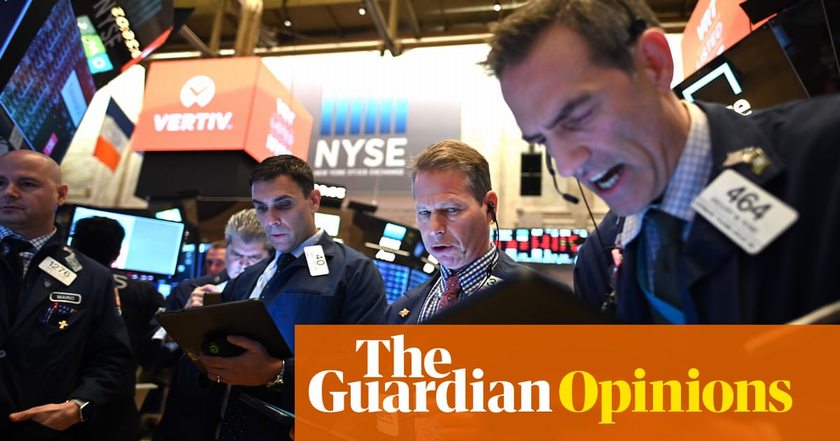The US president Donald Trump’s determination to appoint the economist Judy Shelton for one of many vacant positions on the Federal Reserve Board has put the way forward for central financial institution independence again on the agenda. Shelton has forged doubt on the desirability of, and authorized foundation for, Fed independence, saying final yr, “I don’t see any reference to independence within the laws that has outlined the position of the Federal Reserve.” And he or she has argued for “a extra coordinated relationship with each Congress and the president”. If Fed coverage had been “coordinated” with Trump, then it’s pretty clear who could be calling the pictures.
In fact, one new Fed governor couldn’t upturn many years of follow. However there are options that if appointed, Shelton may exchange Jay Powell when his time period comes up for renewal in 2022, leaving a fox in control of the rooster coop.
Will coronavirus set off a worldwide recession? | Jeffrey Frankel
Learn extra
It isn’t solely within the US that central-bank independence is beneath risk. In Turkey, the president, Recep Tayyip Erdoğan, fired his governor final yr, saying that “we informed him a number of occasions to chop rates of interest” however he didn’t oblige. In India, the federal government requested the Reserve Financial institution handy over a few of its reserves and the governor, Urjit Patel, resigned “for private causes” and his key deputy adopted quickly after with a broadside directed on the prime minister Narendra Modi’s administration: “Governments that don’t respect central financial institution independence will in the end incur the wrath of the monetary markets.”
Central banks all over the world are anxious by these straws within the wind. Otmar Issing, the primary chief economist of the European Central Financial institution, has written of “the unsure way forward for central financial institution independence.” The ECB’s then president, Mario Draghi, was moved to subject a agency defence of the idea earlier than he left his submit. The Financial institution for Worldwide Settlements has famous “the extraordinary burden positioned on central banking because the [2008 global financial] disaster” and warned that central banks can’t ship on the expectations individuals have. Joachim Fels of Pimco has concluded that “the heyday of central financial institution independence now lies behind us”.
Are these prophets of doom appropriate? Will we quickly see management of rates of interest again within the self-interested fingers of finance ministries? Within the phrases of the music, was central financial institution independence only a foolish part we had been going by way of?
I believe not. The newest world survey, by the economists Nergiz Dincer and Barry Eichengreen, although admittedly performed in 2014, exhibits that there’s nonetheless a “regular motion within the course of better transparency and independence over time (and) little indication these tendencies are being rethought”. One could have some grounds for scepticism concerning the measures of independence they use – based on their mannequin, Kyrgyzstan boasts the world’s most unbiased central financial institution – however they will discover no circumstances the place adjustments to laws bringing the central financial institution again beneath political management have been applied.
Within the west, whereas Trump has huffed and puffed, he appointed Powell, a person with typical instincts and a spine. The British prime minister, Boris Johnson, resisted the temptation to nominate a Brexit supporter to the Financial institution of England and named a veteran BoE insider, Andrew Bailey, who has independence in his bones. Within the eurozone, a equally impartial alternative emerged as Draghi’s successor and a change within the ECB’s standing would require a brand new EU treaty. The probabilities of which are vanishingly small. EU leaders present no indication of taking the danger of opening up the structure to additional referendums, as could be needed in some nations. Moreover, among the political strain for motion has diminished. Belief within the ECB fell sharply after the eurozone disaster virtually a decade in the past however has recovered in most nations within the final couple of years. Even in Greece, the ECB is trusted greater than the nationwide authorities.
There has, it’s true, been a change in political rhetoric. After a protracted interval through which governments resisted any commentary on interest-rate selections, some have turn out to be extra vocal. Jacob Rees-Mogg, the Conservative who’s the chief of the Home of Commons, dubbed Mark Carney, the outgoing Financial institution of England governor, a “second-tier Canadian politician” who did not get a job at residence, after Carney disagreed with Rees-Mogg’s financial judgment on the prices of Brexit. And Trump has characteristically weighed in with tweeted criticism of the Fed.
Ought to central banks regard this renewed disputatiousness as a foul and harmful factor? They could, if they need, however I think they’re pushing water uphill. We’ve got moved right into a much less respectful age, which isn’t stunning, given the errors made by central banks (and others) within the run-up to the 2008 disaster. As an alternative of bemoaning the surge of remark and problem, central banks want to boost their sport, improve their transparency and get higher at explaining and justifying their actions and selections.
Andy Haldane, the Financial institution of England’s chief economist, has proven that a lot of what central bankers say is meaningless to all however a small proportion of the inhabitants. Solely 2% of the inhabitants can readily perceive the minutes of the Fed’s Open Market Committee, which units rates of interest, whereas 70% can perceive a Trump marketing campaign speech. That hole must be closed and central banks ought to make their work extra accessible to the general public. Possibly a collective journey to Kyrgyzstan is in an effort to observe greatest follow in motion.
• Sir Howard Davies, the primary chairman of the UK’s Monetary Providers Authority, is chairman of RBS. He was director of the LSE and served as deputy governor of the Financial institution of England and CBI director normal.
© Venture Syndicate









